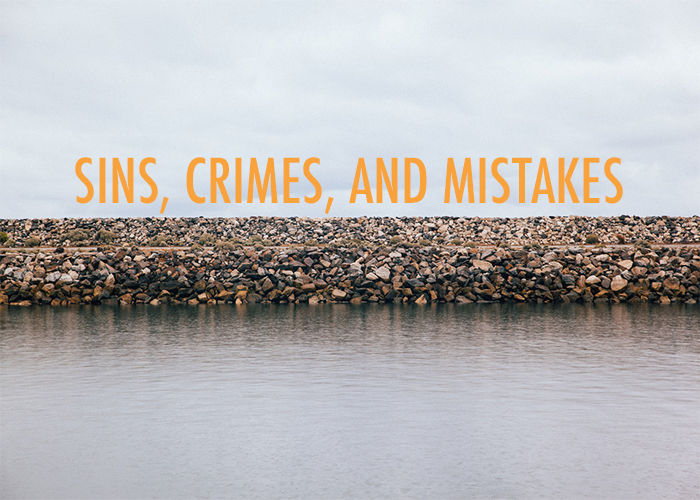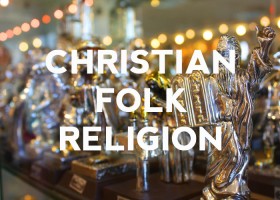SINS, CRIMES, AND MISTAKES

Written by Doug Ponder on November 30, 2014
Distinctions in the Dark
One of the realities of living in a world corrupted by evil is the consequent loss of distinctions—for in the dark almost everything looks the same. But when we shine the light of God’s Word into our murky minds and darkened hearts, the shadows flee and the contours of God’s created world begin to be seen for what they are. I say begin to be seen because it may take some time for our eyes to adjust to the glories all around us (Mark 8:22-24).
There are many creational distinctions that we have lost the ability to appreciate in the dark: the glorious differences between men and women, the differences between humans and the animals given to us, the difference between identity and action, the difference between perception and reality, even the difference between right and wrong and between good and evil. Many people are quite confused about all of these, seeing fifty shades of grey where God made black and white.
This matters because a failure to see the world as God really made it inevitably hinders our ability to live in the world as God intended. This principle is evident in another distinction that we’ve lost in the dark: we no longer recognize the difference between sins, crimes, and mistakes.
If you’re the kind of person who finds definitions rather dull, then maybe you shouldn’t read the part of this sentence that defines a sin as anything contrary to God’s character or commands, a crime as anything contrary to the laws of the land, and a mistake as any unintentional error of evaluation, interpretation or action.
As unintentional errors, mistakes are not necessarily illegal or morally wrong. For example, confusing someone for your first grade teacher is a mistake, not a sin against God or a crime against humanity.
As violations of the law of the land, crimes are actions with legal penalties attached to them. For example, it is a crime to break the speed limit, so you may be ticketed if you are caught speeding.
As disobedience to God, a sin is any thought, word, attitude, or action that misses the mark of God’s holy standard for his people. For example, greed is sin because it both opposes the heart of God and also resists his command for us to love our neighbor.
Confusing Sins and Mistakes
When we sin, the human heart is tempted to hide, blame-shift, or minimize the seriousness of what we have done. “I couldn’t help it.” “It’s not a big deal.” “It wasn’t my fault.” We are masters at making excuses. But it’s important to see these excuses for what they are. Excuses are attempts to avoid confessing our rebellion against God, but all they actually do is cloud our ability to see our need for forgiveness.
One of the chief ways we do this is by calling our sins “mistakes.” For example, this happens every time a couple ends an argument with I didn’t mean to instead of, “I was wrong. I was acting sinfully. I’m sorry. Please forgive me.”
“Baby, I’m sorry. I didn’t mean to eat your last piece of cake. I couldn’t help it.”
“It’s OK. I’m sorry too. I didn’t mean to yell at you last night or say those hurtful things.”
“Yeah, me neither. I love you. I don’t mean to act like a jerk. It just happens sometimes.”
The truth is that they did mean to do all those things. No one forced him to eat her cake; he chose to do it and he meant to do it. No one forced her to yell at him; she chose to respond that way and she meant to hurt him. In anger, she hurt his feelings to get even with him for how his selfishness hurt her. And again, no one forced him to respond to her yelling with similar sins of his own. He meant to act like a jerk because he was frustrated with her acting like a jerk to him.
You and I are no different, and this too is something we should repent of. By treating our sins as “mistakes,” we arrogantly hide behind a wall of excuses instead of stepping into the light of truth to face the reality of who we are: we are sinners who sin big and sin often. That is why the forgiveness of Jesus, which he calls us to extend to others (Col. 3:13), is such a big deal. We are big sinners, but we have an even bigger Savior. Thus we make the grace of God cheap by calling our sins “mistakes.” Instead, let us call sins what they are. Let your sins be big, but let your trust in Christ be bigger.
Confusing Crimes and Sins
Just as confusing sins and mistakes has tremendous implications for us at the personal level, confusing sins and crimes has tremendous implications for us at the societal level.
The distinction between sins and crimes is real but not always easy to see. This is because some (but not all) illegal activities are both crimes and sins. For example, stealing is both a crime and a sin. Rape is both a crime and a sin. Murder is both a crime and a sin. They are crimes and sins at the same time because they break the laws of the land and they break the commands of God. Of course, just because some actions are both crimes and sins at the same time does not mean that crimes and sins are the same thing—just as coffee can be hot and black at the same time without meaning that temperature and color are the same thing.
Admittedly, the relationship between crimes and sins gets a bit tricky because God has told us to “submit ourselves to the governing authorities” (Rom. 13:1), which is another way of saying that we must obey the laws of the land so far as we are able. To give a practical example, this means that disliking the speed limit is not an acceptable excuse for breaking it. And although God doesn’t technically care if your car travels at 61 m.p.h., he absolutely cares if you drive at that speed in a zone that says “Speed Limit 60.” Because God has told us to submit to the laws of the land, breaking the speed limit is both a crime and a sin.
All this matters greatly because we create dreadful problems when we cannot distinguish the difference between sins and crimes. Either we will think that whatever is a crime is always a sin, or else we will think that whatever is a sin should always be a crime—both ideas are wrong, and both will get us into a world of trouble.
First, consider the danger of thinking that whatever is illegal is always a sin. This overlooks the fact that governments can (and often do) outlaw activities that God actually requires. For example, in the first few centuries Christians were regularly placed on trial and forced to renounce their loyalty to Christ over Caesar. It was illegal for them to refuse, and they were usually punished by death. They were guilty of a crime in the eyes of Rome, but they were not guilty of any sin in the eyes of God. In fact, it would have been a sin for them to obey that law of Rome in this case.
Although that example may seem distant, it is still relevant today. Some activist groups are currently trying to pass laws that would make it illegal for Christians to voice their objections to same-sex marriage (which one of my favorite authors like to call same-sex mirage, since real marriage, according to the God who made it, is a covenant between a man and a woman and cannot be anything else). So, speaking the truth about homosexuality may one day be a crime in the eyes of our government, but it will never be a sin in the eyes of God. In fact, it would be a sin for God’s people to refuse to talk about such things, since he has commanded us to speak the truth in love (Eph. 4:15).
Second, consider the danger of thinking that whatever is sinful always ought to be illegal, too. This error is seen on both the left and right sides of the political aisle, though one side historically is more guilty than the other. Our problem is that we have forgotten the role of government according to the sphere that God has given it. God calls human governments to maintain order and justice (Rom. 13:1-7). In other words, it’s the job of the government to keep us from getting mugged or murdered, not to tell us what a healthy lunch is.
Now it’s true that eating junk food all the time is a bad idea, but it’s an even worse idea to turn the government into the Sin Police. Theft is a crime, but gluttony is a sin. We want police to track down thieves, but we don’t want them arresting every suspected glutton. (How would they arrest you for gluttony anyway? Hey look at that guy over there. He sure looks like a glutton to me!)
I don’t say this because I want to indulge in gluttony and get away with it. I say this because the state can’t possibly have any way of stopping sins of the heart like gluttony, lust, greed, etc. They are powerless to do anything effective about such things, and passing laws in the hopes of stopping sins of that kind will only make things worse. Yet this is the direction we are currently headed.
Is there too much sugar in soda? Make a law limiting the size of the drinks!
Is a certain group of people getting their feelings hurt? Make a law that punishes for “hate speech!”
Is our country full of selfish people? Make a law to increase their taxes and redistribute their money!
Here is the problem with that approach: when we rely on the government to fix us by turning certain sins into crimes, we end up applying false solutions to real problems. More than this, our false solutions do not leave room for the true solution to every sin, which is the good news of the life, death, and resurrection of Jesus for sinners like you and me. Instead we end up wedding our consciences to the state as if it were the Holy Spirit, and we place our hope in the government to cure sin if it were our Savior. But there is only one Holy Spirit, and his name isn’t Nancy Pelosi. There is but one Savior, and he’s not John Boehner.
Doug Ponder is one of the founding pastors of Remnant Church in Richmond, VA, where he serves in many of the church’s teaching ministries. He has contributed to several published works and is the author of Rethink Marriage & Family. His interests include the intersection of theology, ethics, and the Christian life. Follow him on Twitter @dougponder.






